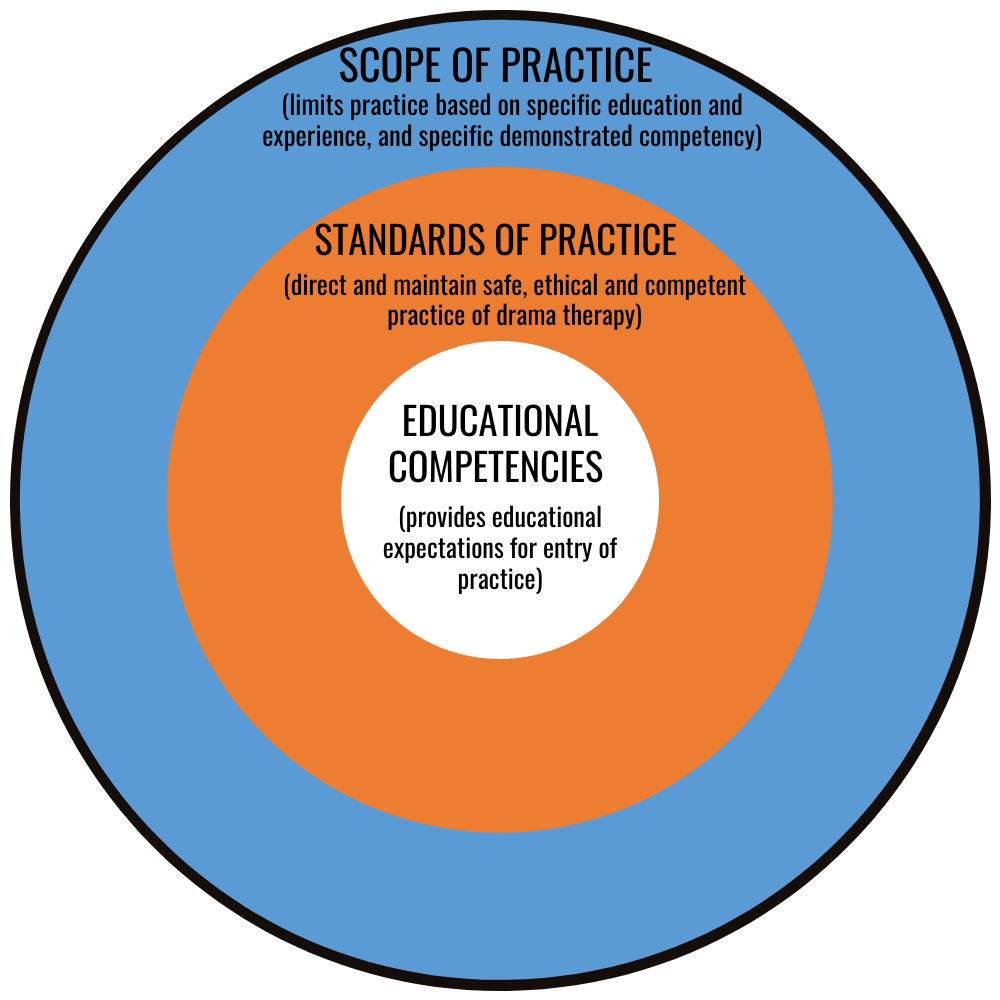
Drama therapy is the intentional use of drama and/or theater processes to achieve therapeutic goals.
Drama therapy is an embodied practice that is active and experiential. This approach can provide the context for participants to tell their stories, set goals and solve problems, express feelings, or achieve catharsis. Through drama, the depth and breadth of inner experience can be actively explored and interpersonal relationship skills can be enhanced.
What is a Drama Therapist?
A Registered Drama Therapist (RDT) is certified in the practice of drama therapy, and follows the NADTA Code of Ethics, the NADTA Scope of Practice, and the Standards of Practice.

The educational requirements for the RDT involve: A master's or doctoral degree in drama therapy from a program accredited by the North American Drama Therapy Association OR a master's or doctoral degree in theater or a mental health profession with additional in-depth training in drama therapy through NADTA's alternative training program. Board Certified Trainers/Registered Drama Therapists (RDT/BCT) train and supervise students in this alternative training program. Drama therapy education includes coursework in psychology and drama therapy, experience in theater, and supervised internship and work experience. Click here for more information about education to become a drama therapist.
How Does Drama Therapy Work?
Drama therapy uses play, embodiment, projection, role, story, metaphor, empathy, distancing, witnessing, performance, and improvisation to help people make meaningful change.
A drama therapist first assesses a client's needs and then considers approaches that might best meet those needs. Drama therapy can take many forms depending on individual and group needs, skill and ability levels, interests, and therapeutic goals. Processes and techniques may include improvisations, theater games, storytelling, and enactment. Many drama therapists make use of text, performance, or ritual to enrich the therapeutic and creative process. The theoretical foundation of drama therapy lies in drama, theater, psychology, psychotherapy, anthropology, play, and interactive and creative processes.
Who Can Benefit from Drama Therapy?
Drama therapy is for everyone across the lifespan. You do not have to be “good” at acting to benefit from drama therapy!
Client populations may include persons recovering from addiction, dysfunctional families, developmentally disabled persons, abuse survivors, prison inmates, homeless persons, people with AIDS, older adults, behavioral health consumers, at-risk youth, and the general public.
Drama therapists work in a variety of mental health and community settings. Below are some possible examples of locations where drama therapists can be found:
- Mental Health Clinics
- Schools
- Hospital Medical Units
- Hospital Mental Health Units
- Substance Abuse Treatment Centers
- Adult Day Treatment Facilities
- Correctional Facilities
- Community Centers
- After School Programs
- Programs for Older Adults
- College Counseling Centers
- Programs for Persons with Disabilities
- Businesses
- Programs for Refugees and Immigrants
- Shelters
- Residential Facilities
- Nursing Homes
- Private Practice Settings
- Corporations
- Theaters
- Housing Projects
- Medical Schools
- Training Organizations
What are the Outcomes?
- Drama therapy is beneficial for individuals, families, and communities struggling with transition, loss, social stigmatization, isolation, and conflict. It is an effective option for the treatment and prevention of anxiety, depression, and addiction, among other conditions. Drama therapy can promote positive changes in mood, insight, and empathy, and it can facilitates healthy relationships.
- We invite you to learn more about drama therapy research and the Drama Therapy Review.
What is the North American Drama Therapy Association (NADTA)?
- The North American Drama Therapy Association (NADTA) was incorporated in 1979 to establish and uphold rigorous standards of professional competence for drama therapists. The organization maintains requirements that must be met to qualify as a registered drama therapist (RDT). NADTA promotes drama therapy through information and advocacy.
-
As a member organization of the National Coalition of Creative Arts Therapies Associations (NCCATA), the NADTA is aligned with professionals in the fields of art, music, dance, and poetry therapies, as well as group psychotherapy and psychodrama.
Can I Attend a Conference or Workshop?
- A good way to find out about drama therapy is to attend one of our national conferences. There you can see the work of drama therapists from across North America and throughout the world presenting many different types of drama therapy techniques used with different client populations. Conferences are open to the public and do not require previous exposure to drama therapy. You can also meet and network with professionals, talk with students about the schools they are attending, and go to workshops on such topics as alternative training, registry, and professional ethics. Watch our Events Page for information about the next conference.
- If you are unable to attend a national conference, there may be regional conferences and workshops in your area. These will be listed on the Events Page as well.
|